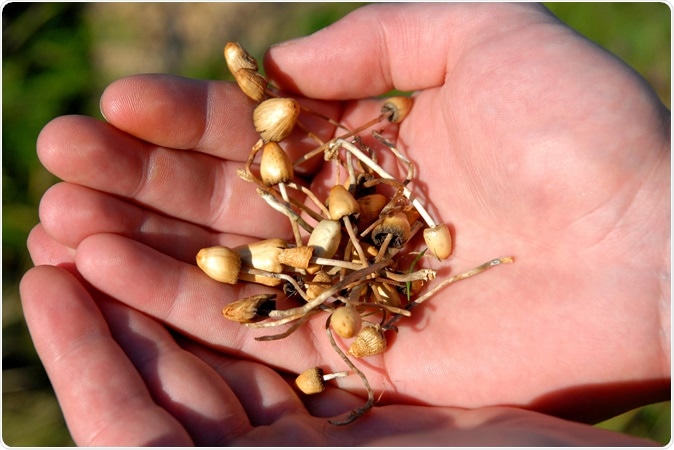The active ingredient in magic mushrooms is psilocybin. Psilocybin is a naturally occurring psychedelic prodrug compound produced by more than 200 species of mushroom and is the reason behind the “high” provided by the magic mushrooms. Now, Psilocybin may soon achieve legal status to be used for treatment of difficult to treat depressive illness.

Hallucinogenic magic mushrooms. Image Credit: Andrea Delbo / Shutterstock
Compass Pathways, a British life sciences company, have announced this week that they have been given the Food and Drug Administration’s (FDA) Breakthrough Therapy designation for their studies and clinical trials with psilocybin. This status would fast-track the approval of psilocybin based therapy for intractable cases of depression.
Psilocybin and other psychedelic drugs of abuse such as LSD are classified as Schedule I controlled substances in the US, according to the Drug Enforcement Administration (DEA), which makes them illegal for medical use. Opioids on the other hand are classified as Schedule II drugs which mean that they can be used medicinally with prescription but are liable to be abused recreationally.
The new trials with psilocybin would use “microdoses” that are usually less the dosage of recreational abuse and assess their usefulness in treating anxiety and depression. Several pilot studies from the UK and the US have shown that this agent may help people with depression who have not responded to other treatments. The Phase 2 trial received the FDA nod in August this year. This new status awarded by the FDA would cut the approval time for psilocybin based therapy by half. Usually a drug may take around 12 years to be approved. With the Breakthrough therapy status, a drug may be approved in an average of around 5.7 years.
Compass would now sponsor the first large-scale trial of psilocybin across different centres in Canada and Netherlands over the next year to see its efficacy and safety. Their version of the drug is synthetic and is made in the labs.
In the pilot study in 2016, use of psilocybin based treatment showed that after a week of treatment patients improved on their depressive assessment. The score used to assess depression was Quick Inventory of Depressive Symptoms (on a scale of 0 to 27). After a week of therapy there was an average fall of scores from 19.2 to 7.4 - a 61 percent drop in symptom severity. At the end of three months after therapy the scores remains 48 percent lower than the baseline or start of therapy. The Phase 2 trial next year would include 216 participants and would be recruited from 12 to 15 research sites in Europe and North America.
According to a statement from George Goldsmith, the executive chairman of Compass, “This is great news for patients. We are excited to be taking this work forward with our clinical trial on psilocybin therapy for treatment-resistant depression. The FDA will be working closely with us to expedite the development process and increase the chances of getting this treatment to people suffering with depression as quickly as possible.”
Depression affects around 40 million individuals worldwide. Counselling therapy and medication helps most individuals. However around 10 to 30 percent of patients do not respond to these methods and need novel approaches for treatment. Among many of the patients the drugs against depression may be effective but may not be safe for use or well tolerated. Psilocybin could help these patients.